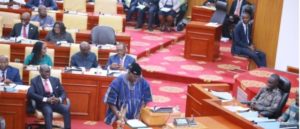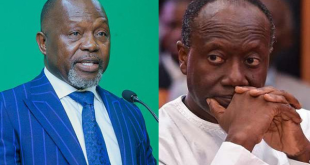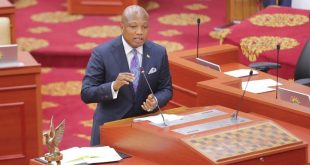
The government has committed an amount of GHS 8.2 billion to boost small and medium-sized enterprises (SMEs) in the country. This announcement was made by the Minister for Finance, Dr. Mohammed Amin Adam, during his mid-year budget review presentation to Parliament on July 23, 2024.
“Mr. Speaker, I am therefore happy to announce that on July 16, 2024, President Akufo-Addo launched the SME Growth and Opportunity Programme (SME GO), to connect SMEs with resources, expertise, and opportunities. Altogether, we have mobilised about GHS8.2 billion through DBG, GhanaExim Bank, GEA and other partners for SMEs to grow and increase competitiveness in regional markets,” he said.
Dr. Mohammed Amin Adam highlighted the critical role that SMEs play in the Ghanaian economy, noting that they are the backbone of economic growth, job creation, and innovation. “SMEs are the engine of our economy, driving growth, creating jobs, and fostering innovation. This substantial allocation underscores our commitment to supporting these enterprises and ensuring their sustainability and growth,” he stated.
The GHS8.2 billion fund will be directed towards several initiatives aimed at addressing the challenges faced by SMEs, including access to finance, capacity building, and market access. Dr. Adam explained that the government recognises the hurdles that SMEs encounter and is dedicated to creating an enabling environment for their success.
One of the primary components of this funding is the provision of affordable credit facilities. Many SMEs struggle with securing financing due to high interest rates and stringent lending conditions. The government aims to alleviate these issues by working with financial institutions to offer loans at more favourable terms. “Access to affordable credit is essential for the growth and expansion of SMEs. By providing these financial resources, we are empowering our entrepreneurs to invest in their businesses, increase productivity, and create more jobs,” Dr. Adam noted.
In addition to financial support, the government is also investing in capacity-building programs designed to enhance the skills and capabilities of SME owners and their employees.
These programs will focus on areas such as financial management, marketing, and technology adoption, equipping SMEs with the tools they need to compete effectively in both local and global markets.
Market access is another critical area where the government is focusing its efforts. Many SMEs face difficulties in reaching wider markets due to limited resources and networks. The government plans to facilitate greater market access through initiatives that connect SMEs with larger enterprises, export opportunities, and government procurement processes.
Dr. Adam emphasised the importance of a supportive ecosystem for SMEs, which includes not only financial and capacity-building support but also a conducive regulatory environment. The government is committed to streamlining business registration processes, reducing bureaucratic red tape, and ensuring that policies are SME-friendly. “We are committed to creating a business environment that supports the growth and sustainability of SMEs. This includes simplifying regulations and making it easier for businesses to operate and thrive,” he said.
The mid-year budget review also highlighted the broader economic context within which these initiatives are being implemented. Despite global economic challenges, Ghana’s economy has shown resilience, with positive growth indicators and improvements in key areas such as inflation and exchange rate stability. Dr. Adam attributed these successes to prudent fiscal management and effective policy measures.
“Our economy grew by 4.7% in the first quarter of this year, exceeding our expectations. This growth is a testament to the resilience of our economic policies and the hard work of Ghanaians,” he remarked. The Minister also pointed out the progress made in stabilising inflation and the exchange rate, which has brought relief to businesses and households alike. “We have seen significant improvements in inflation and exchange rate stabilisation, which are critical for maintaining economic stability and fostering a conducive environment for investment and growth,” he added.
This, the Minister urged all stakeholders to support the government’s efforts in building a more inclusive and prosperous nation. “Together, we can achieve our vision of a Ghana where every citizen has the opportunity to thrive. Let us continue to work together to build a brighter future for all,” he concluded.
 Uniquenewsgh.com News, Politics, African News Updates & More
Uniquenewsgh.com News, Politics, African News Updates & More



